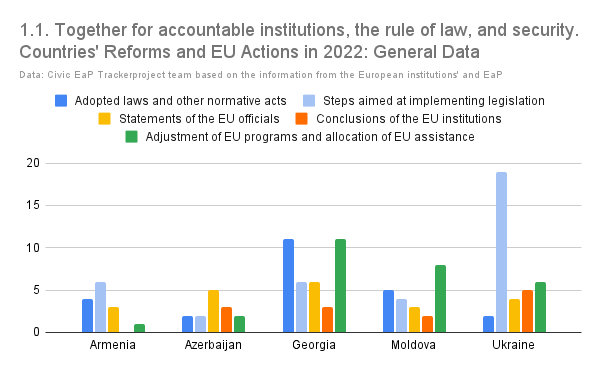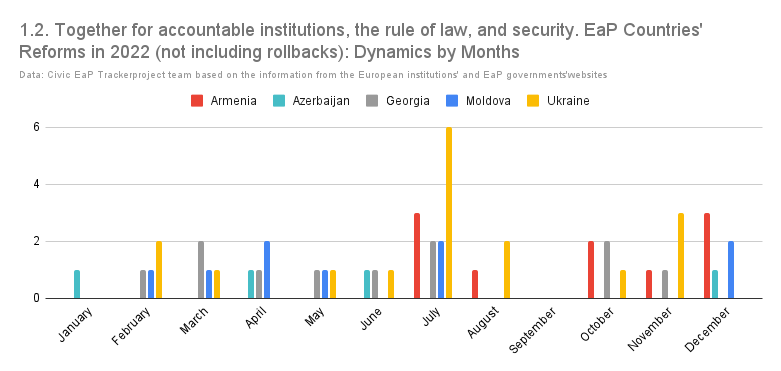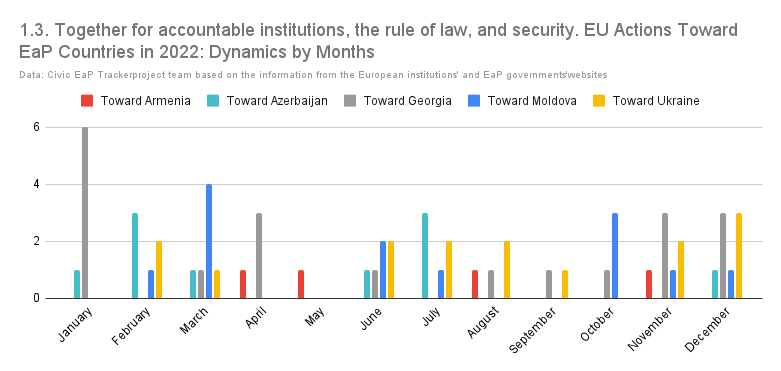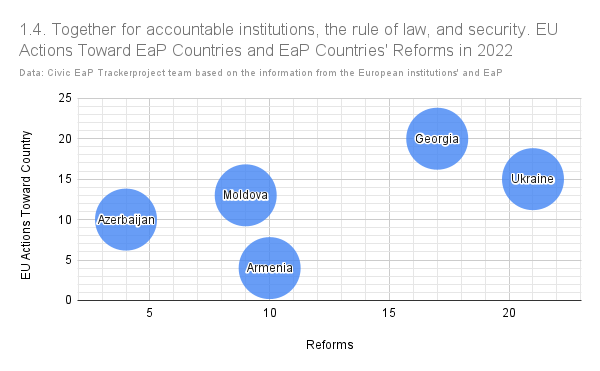The post-2020 Eastern Partnership priority “Together for accountable institutions, the rule of law, and security” has gained particular importance in recent years in the context of the EU’s neighbourhood policy and the respective processes in the target countries. The Russian invasion of Ukraine emphasized the need to build effective and resilient states in the face of growing global turbulence. In addition, throughout the Eastern Partnership region, there has been a growing demand from citizens to ensure trustworthy relations with the state and build sustainable and strong institutions, which is expressed in regular requests and speeches of civil society.
Authors: Sergiy Gerasymchuk, Mykhailo Drapak (Foreign Policy Council “Ukrainian Prism”)
The conclusions presented in the thematic brief are the sole responsibility of the “Ukrainian Prism” team and do not necessarily reflect the views of the EU and partners from the Eastern Partnership countries.
Contributors by gathering data on their countries:
- Sargis Harutyunyan (Media Diversity Institute, Armenia),
- Mariam Paposhvili (Georgian Institute for Strategic Studies),
- Natalia Stercul (Foreign Policy Association of Moldova),
- NigarIslamli (Center for Economic and Social Development, Azerbaijan)
Introduction
After all, the issue of accountable institutions, the rule of law and security has become one of the key issues related to reforms for states that have obtained or are seeking to obtain the status of a candidate for accessing the EU because European institutions have determined that these issues are the basis of the accession process.
The implementation of reforms in the countries of the Eastern Partnership gained a new basis of support from the EU in 2021 when the “Joint Staff Working Document – Recovery, resilience and reform: post 2020 Eastern Partnership priorities” was published. This set of targets and tasks was United Europe’s response to the challenges that have arisen on the continent and in the neighbourhood policy region, given the Covid-19 pandemic and local political processes. The implementation of the revised priorities with a view to the terms of adoption should has begun in full in 2022. However, this time brought even greater political, social, economic and security challenges to the EU’s neighbourhood policy, caused by the Russian invasion of Ukraine and the Kremlin’s aggressive actions towards Europe in general. Accordingly, the already developed priorities had to receive new settings for implementation, which would not only enable their implementation in new circumstances but also respond to new challenges ad hoc. This requires the EU to have a new quality of involvement in the process of reforms in the countries of the Eastern Partnership and more active support for them.
This thematic brief is the first in a series of studies by the team of the project “Civic EaP Tracker: Monitoring EaP targets, deliverables and related reforms”, dedicated to the involvement of the EU in transformations in the countries of the Eastern Partnership. The research group seeks to analyse which aspects of the situation in the countries and which reforms the European institutions and EU representatives in the target countries paid attention to, how they adapted their actions in this context to the new political, social, economic and security circumstances, as well as how consistent the countries were in implementing reforms in response to Brussels’ reactions. For this purpose, data were collected on statements by European officials, official conclusions regarding the implementation of policies by EU institutions, and changed or newly established support mechanisms (programs, projects and funds), the addressees of which were partner countries. Information was also collected on the laws and other legal acts adopted in the Eastern Partnership states and steps in their implementation related to the priorities of the “Joint Staff Working Document – Recovery, resilience and reform: post 2020 Eastern Partnership priorities”. The analysis covered all the important events of 2022 in this context.
The study has a common framework for Armenia, Azerbaijan, Georgia, Moldova and Ukraine. Due to the de facto termination of the participation of Belarus (captured by a self-proclaimed authoritarian regime) as a state in the Eastern Partnership, the study will present a separate perspective of independent Belarusian civil society on the topic. This thematic brief is devoted to the processes in the area of priority “Together for accountable institutions, the rule of law, and security”. Accordingly, all the analysed information about the actions of the EU and reforms in the partner countries was related to the issues of this chapter of the Joint Staff Working Document.
Collected Data and Results
The results of data collection and categorisation by the team of the project “Civic EaP Tracker: Monitoring EaP targets, deliverables and related reforms” demonstrate that during 2022 EU actors communicated relatively evenly with the analysed Eastern Partnership states on the topic of accountable institutions, the rule of law and security, without assigning anyone exceptional attention. At the same time, it is worth noting that the nature of communications with the governments of the countries differed, depending on the level of relations between them and Brussels and priorities in reforms determined at the national and European levels. However, in all cases, European actors encouraged states to carry out relevant reforms and declared their support in this process.

The dialogue between the EU on the one hand and Georgia, Moldova and Ukraine on the other in 2022 was invigorated by the desire of the states to fulfill the conditions for advancement in joining the EU. Accordingly, the communication here mostly related to the implementation of specific solutions, focused on their details, had both critical and encouraging manner, and took place both ad hoc and within the framework of planned bilateral/multilateral activities. In addition, during the year, European institutions, with their appeals to Moldova and Ukraine, also had been responding to the crisis phenomena related to the Russian invasion of Ukraine and the flow of Ukrainian refugees. In some issues, those appeals related to certain aspects of the priority “Together for accountable institutions, the rule of law, and security”. As for the dialogue with Armenia and Azerbaijan, the EU’s communication with the respective countries took place within the framework of planned bilateral cooperation formats, such as meetings of thematic committees and groups.
Also, during the year, European institutions presented some interim assessments (conclusions) for Azerbaijan, Georgia, Moldova and Ukraine regarding the implementation of individual reforms, which in particular are part of the priority “Together for accountable institutions, the rule of law, and security”. In the case of relations with official Baku, it is about ascertaining the need to continue a limited list of reforms and a dialogue on their implementation. In the case of Georgia, Moldova and Ukraine, the EU’s key conclusions related to the assessment of already implemented reforms connected to the possibility of granting candidate status for accession (this stage was postponed for official Tbilisi, and granted for Chisinau and Kyiv). Also, the European Commission published the fifth assessment of the situation and state of reforms under the visa suspension mechanism for three countries, noting their compliance with this special regime but also indicating the need to implement detailed solutions according to the priority analysed in this thematic brief. At the same time, last year, the EU, in another official opinion, expressed dissatisfaction with the results of judicial reform in Georgia and suspended the provision of another tranche of macro-financial assistance to the country because of this. In addition, in 2022, European institutions made critical comments on reforming the work of the Constitutional Court of Ukraine based on the conclusions of the Venice Commission. After all, during the year, the EU published two conclusions – on the implementation of the Association Agreement and reforms of the cyber security sector in Ukraine – noting the state’s progress and pointing to the need for continued transformations in certain areas.
After all, taking into account new external challenges and changes in the situation/progress of countries in individual reforms, during 2022, the EU also established new programs/projects and allocated additional funds to support transformations in the analysed countries of the Eastern Partnership (here the programs and projects that were implemented from the past years are not counted). In this context, the decisions of the European institutions were primarily aimed at Georgia, Moldova and Ukraine. In the Georgian case, it was about strengthening reforms in the judicial sphere, in the fight against corruption and organised crime, increasing the capacity and responsibility of law enforcement agencies, improving the infrastructure of cyber protection and road safety, and extending the mandate of the EU Monitoring Mission. The adjustments of EU support to Moldova in 2022 were primarily related to the strengthening of services responsible for border control, internal security and response to migration, which was due to the influx of refugees from Ukraine to the country. In addition, United Europe was one of the parties that contributed to the strengthening of the Moldovan security infrastructure in general in the context of threats from the Russian invasion of Ukraine. Aggressive actions of the Kremlin also became the main prerequisite for establishing new mechanisms or allocating certain types of support to official Kyiv from the EU in the context of the priority “Together for accountable institutions, the rule of law, and security”. They were primarily aimed at improving border management and infrastructure and strengthening cyber security tools. In the case of Armenia, the establishment of new EU projects related to supporting further reforms in the judicial sphere; in the case of Azerbaijan – support for reforms in the judicial sphere and EU strategic communications in the country.
During 2022, Ukraine and Georgia were the most active in implementing the reforms mentioned in the priority “Together for accountable institutions, the rule of law, and security”, Armenia and Moldova were somewhat less active. The fewest adopted normative acts and implementation steps were recorded in Azerbaijan. This difference in activity is primarily related to the provision of recommendations for further movement towards EU accession for Ukraine, Georgia and Moldova, as well as previously implemented reforms in the countries of the Eastern Partnership. In this context, it is worth noting that Georgia and Moldova were the most active in the adoption of the relevant normative acts, and Ukraine and Armenia were the most active in the implementation of decisions through the establishment of practical mechanisms for performing reforms (launching of institutions and management tools, the appointments of executives, etc.).
State actors in the analysed countries also demonstrated a different approach to determining the priority tasks for the adoption of legal acts and their implementation, which may be explained by the previously introduced reforms, requests from society, internal political motivations and the involvement of the EU in various issues (for example, in setting priorities within recommendations for accession to the EU or in defining accents during bilateral meetings). At the same time, in some countries, there were cases when separate decisions could be interpreted as a delay or rollback of reforms. Although such phenomena were rather exceptions, they can endanger the general process of reforms in the relevant field.
Armenia primarily focused on solutions in the domain of anti-corruption, judicial and law enforcement sectors. State actors in Azerbaijan made major decisions in the field of fighting corruption, tracking money flows and information security. The most notable adopted laws and implementation steps in Georgia in 2022 were related to the reform of the judicial system, the fight against corruption and organised crime, as well as de-oligarchisation. At the same time, it is worth noting that some decisions in these areas had been criticised by European institutions and some organisations of Georgian civil society as slowing down reforms or even creating rollbacks in transformations. It is relevant for the proposed changes to the Criminal Code in terms of expanding the powers of law enforcement agencies for covert investigative actions, for the Organic Law on Common Courts in terms of the independence of judges, for the procedure for appointing judges by the High Council of Justice, and also related to the insufficiently communicated decision by the state to abolish the State Inspection Service and replace it with the Special Investigative Service and Personal Data Protection Service. The key decisions of state actors in Moldova in the analysed area related to the reform of the judicial and law enforcement systems, improvement of border management and information security infrastructure. During 2022, Ukraine focused on completing of independent justice and anti-corruption systems (both processes are far from final), improving border management and infrastructure, anti-fraud solutions, and increasing the quality of administrative services. At the same time, some decisions and actions caused concerns in European institutions and some Ukrainian civil society organisations; they can be interpreted as a factor of delaying or even rolling back the reforms. These are amendments to the legislation on the selection of judges of the Constitutional Court, which establish wider control over the institution by the political authorities and the postponement of the selection of the head of the National Anti-Corruption Bureau.
While looking at the timing of decision-making and implementation steps related to the priority “Together for accountable institutions, the rule of law, and security” in the Eastern Partnership states in 2022, it can be observed that the most regular activities in this component were demonstrated in Ukraine. Ukrainian authorities performed corresponding actions almost every month, except for January and April. At the same time, most decisions and steps were taken in July, August, November and December – after the status of a candidate country for joining the EU was granted. Almost all the actions of the Ukrainian authorities in the analysed context were related to the reform of justice and the anti-corruption systems (in December, an addition to the legislation on the appointment of judges of the Constitutional Court was adopted, which faced criticism from the EU and some civil society organisations). It is worth noting that the communications and conclusions of European institutions addressed to Ukraine, starting from June, primarily touched on comments on the state of affairs in these two areas. In the previous months, both the decisions and steps of the Ukrainian authorities, as well as the actions of the EU regarding official Kyiv in the analysed context, were mostly aimed at improving border management and infrastructure.


Georgian and Moldovan state actors in 2022 were relatively regular in making decisions related to the priority “Together for accountable institutions, the rule of law, and security”. In Georgia, the break fell on August, September and December (controversial amendments to the law on common courts were proposed in January), and in Moldova – on January, June, August – November. At the same time, the EU took steps every month (with the exception of May) to encourage Georgia to carry out relevant reforms, with particular activity in January, April, November and December. In this regard, the activity of European institutions at the beginning of the year mostly concerned the launching of new projects or the allocation of aid to the country for transformations, and in the second half of the year (after the refusal to grant the candidate status for accession and the release of recommendations for acquiring this status) – the encouragement of Georgian actors to decisions on the judiciary, law enforcement and anti-corruption, as well as criticism for some of the steps taken. Accordingly, the actions of the Georgian authorities in the second half of 2022 were primarily related to reforming these areas. In the case of Moldova, only decisions related to border management and infrastructure, as well as information security, were concentrated in one period – in March and July, respectively. Other normative acts and implementation steps – mainly in the field of justice reform and law enforcement system – were implemented throughout the year, in April, July and December. At the same time, the EU’s actions regarding Moldova in the context of the analysed priority in the spring related to border management and infrastructure, and from June (the time of granting the status of a candidate for accession) to reforms of the judiciary, law enforcement agencies, anti-corruption and security infrastructure.
The state institutions of Armenia were active in making decisions and implementing steps related to the priority “Together for accountable institutions, the rule of law, and security” in July – August and October – December. They related to the completion of the development of basic institutions to fight corruption, the creation of conditions for the independent selection of judges and the transparency of court activities, and the provision of an alternative detention system. At the same time, EU actions aimed at encouraging and supporting relevant reforms in Armenia took place in April – May, August and November. In the spring, they were associated with the welcoming of the country’s previous progress in transformations, and in the summer and autumn – with the expression of expectations regarding further decisions and with the allocation of funds for the implementation of budgetary programs in the field of justice.
During 2022, Azerbaijani state actors made decisions and implementation steps in the context of the analysed priority in January, April, June and December. Accordingly, in the first half of the year, the country adopted National Action Plans for Strengthening the Fight Against Corruption and for the Promotion of Open Government, as well as amendments to the legislation on information security, and at the end of the year – the decision on the harmonisation of regulatory acts in the field of control over the movement of funds abroad. The dialogue of the EU with the authorities of Azerbaijan in the context of reforms related to the priority “Together for accountable institutions, the rule of law, and security”, as well as actions to support the relevant transformations, was recorded in January – March, June – July and December. At the beginning of the year, the communication of European institutions with Azerbaijani state actors concerned negotiations on signing a new comprehensive agreement between the sides, the situation with the rule of law in the country and security issues, in the summer – judicial reform, the rule of law, improving the quality of administrative services, security issues, readmission. In January, the EU strategic communications project was also launched in Azerbaijan, and in February, a joint project of the World Bank and the EU, which is aimed in particular at strengthening the public administration sector.
Assessment and recommendations
The conducted analysis shows that there is no direct connection between the intensity of EU actions aimed at supporting reforms in the domains of accountable institutions, the rule of law and security in the Eastern Partnership countries, and the intensity of the reforms themselves. There may be several explanations for this. First, transformations are often stretched over time. Thus, in some areas, individual countries have made progress in previous years or started developing solutions for adoption in the future (such as in the context of further law enforcement reforms in Armenia or reforms in the anti-money laundering sector in Moldova). Secondly, decision-making at a certain time requires a set of internal factors (situation in the country, motivations of actors, political will and political capital, entry into force of previous decisions). Thirdly, the higher intensity of actions on the part of the EU is most often associated with the inhibition of reforms in countries, and single statements or decisions of European institutions can have a strong effect and stimulate countries to transform without additional communication (such as in the case of granting the candidate status for accession to the EU to Moldova and Ukraine and with the postponement of granting this status to Georgia). Fourth, we should take into account the difference in the vision of the expected level of cooperation with United Europe by the countries of the Eastern Partnership (for example, Georgia, Moldova and Ukraine have consistently expressed their desire to become a member of the EU in recent years, while Azerbaijan and Armenia have not).

Arguably, the decision of the EU to grant candidate status to Ukraine and the Republic of Moldova accelerated reforms in most of the EaP states (with the exception of Azerbaijan and Belarus) and caused high dynamics of the respective processes in July 2022. By demonstrating a clear EU perspective Brussels invigorated national elites to accelerate the reforms and that was most noticeable in the countries with a strong civil society which exerted additional pressure on the national governments. Another trigger of the accelerated reforms was Russian aggression against Ukraine which made the need for the enhanced resilience evident whereas the area of Accountable Institutions, the Rule of Law and Security is among the most sensitive in this regard (in particular for Ukraine and for the neighbouring Moldova). The emerging trends of this king have to be cherished and the growing positive impact has to be well communicated to stakeholders and decision-makers in the respective countries.
Noteworthy, while for Georgia, Moldova and Ukraine the accelerated adoption of the relevant normative acts and the implementation of decisions through the establishment of practical mechanisms for performing reforms could have been explained by the desire to demonstrate progress prior to the EU’s decision on granting the status of a candidate for accessing the EU, the case of Armenia proves that even lacking such motivation the government still demonstrated its commitment for moving on the European path. The progress was mostly nationally-driven with a relatively low record of the EU actions. Such approach of the Armenian government deserves to be noted.
Bearing in mind new external challenges and changes in the situation/progress of countries in individual reforms during 2022 it is recommended to create the additional monitoring and assessment tools for measuring the impact of the established new programs/projects and allocated additional funds on the transformations in the target countries of the Eastern Partnership and in case of their success in Georgia, Moldova and Ukraine to elaborate tailored instruments for Armenia and Azerbaijan.
Besides, security has to be prioritized and the wider scope of the direct and indirect threats has and can be tackled via the instruments provided by the Eastern Partnership framework.
Finally, civil society in all the EaP countries proved to be the actor of changes who promoted the reforms, highlighted the rollbacks and contributed to sustainability of the European path of the EaP countries. It deserves further support to be able to initiate, monitor and assess the respective reforms and to promote the EU integration in the target countries.



